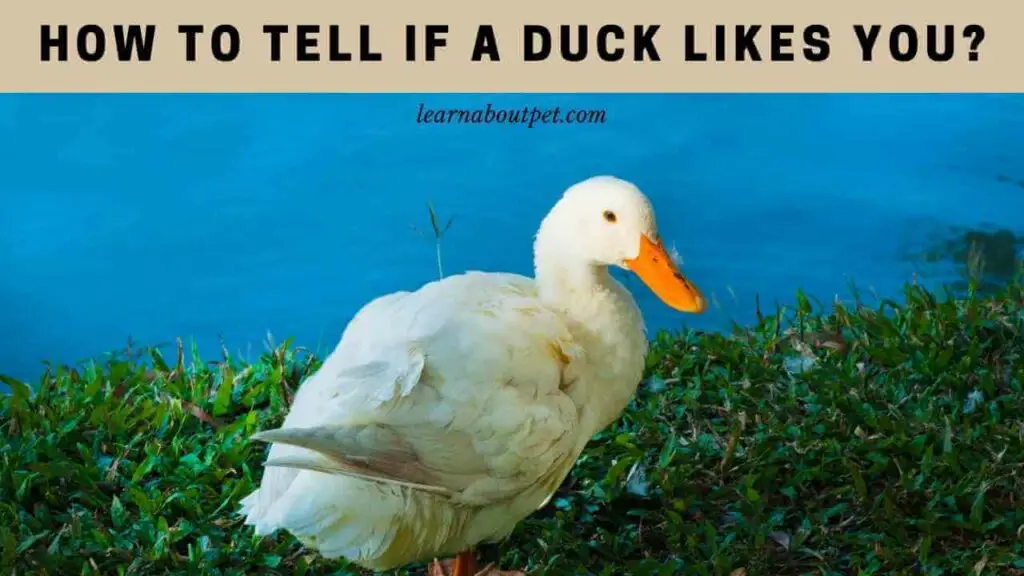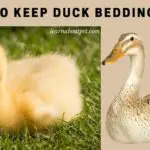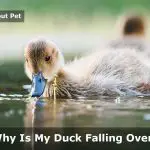Ducks are very cute, loving and social birds. Everyone adores pet ducks or feeds them on lake visits or family picnics. Ducks can bond emotionally with those who care for them but can ducks go one step further and recognize you and like you?
How to tell if a duck likes you? When a duck has performed its natural habit of imprinting, in which they tend to create a lifetime bond with someone who feeds them and cares for them in childhood, either it is human or their mother. Ducks show many signs to show their affection which can be deciphered from duck body language. They like cuddling, hugging and being held by you.

How To Tell If A Duck Is Happy?
These lovely ducks create a very happy environment because they are very jolly creatures. You can play with them and enjoy having a great time.
Ducks will quack a lot when they are happy. Sometimes they may also toss their heads up and down. Ducks will sometimes waggle their tail feathers to show excitement.
Do Ducks Enjoy Human Interaction?
Ducks certainly enjoy human company when they are familiar with the person. They play with humans, give hugs, and like to be held by humans. They not only enjoy interacting with humans but also enjoy the company of humans.
If there is anything to emphasize about the duck, it is its sociability. Ducks are very social animals. but you may be wondering about how to tell if a duck likes you. Ducks can hear and respond to sounds and start interacting with humans through speech. You can even bring them toys and interact with them through these items.
You will be surprised to learn that ducks are also capable of learning simple tricks and can win your heart by bringing the toy you just threw into the water. Talking to ducks helps bond with them. You could also give them names.
Ducks are renowned for their ability to perform stunts and be affectionate. You could buy bird-shaped toys to play with or just take them to the tub to make them swim. Each duck has its personality. They might even play with strings or try to dig holes.
Talk to your duck friend, studies show that ducks understand and can differentiate human voice. It will help you gain a friendly relation with your duck more quickly.
How Do You Know If A Duck Has Imprinted On You?
Imprinting influences a duck’s life a lot. It helps ducks to create an identity. Ducklings imprint right away after birth but they can’t recognize faces for at least 1-2 weeks and imprints through voice recognition.
Symptoms of ducks imprinting on you include hugging you. When ducks like being held by you is another sign that duck has imprinted on you. Overall if you observe that a duck is having a good time when it is around you, you can say that they have imprinted.
How To Tell If A Duck Likes You?
When a Duckling is born, it shows its affection by the natural habit of imprinting. Imprinting means when a duck gets close to or bonds itself to its guarding figures like its mother or caretaker.
Ducks are very playful and sometimes mischievous but how to tell if a duck likes you? To know that answer we listed a few signs that ducks show to someone they like, that is:
- Often ducks make efforts to grab attention from their favorite people. They tend to nudge with their beaks and make different sounds to grab your attention.
- They will follow you, when playing they come up to you to play with them.
- If a duck likes you, they enjoy cuddling, embracing and tend to sleep around people and ducks who they are most comfortable with.
- Ducks also sometimes peck at the hands of people when feeding.
Do Ducks Like Hugs?
Yes, ducks love hugging their friends. Ducks are very affectionate and loving creatures. This is also a reason why ducks become a great pet for many people.
Besides just hugging them, if they are comfortable with you, don’t hesitate to pet them. Showing them your love not only deepens your bond with ducks but also makes them more playful and comfortable with you. Feeding them and playing with them is another gesture they like. They can play with a ball or a small toy.
Ducks also like to snuggle around the people they like. As ducks sleep in groups, this gesture of snuggling shows how affectionate ducks are with you.
Do Ducks Know You Love Them?
Ducks are very intelligent and emotional birds. Ducks understand who their friends and companions are. Being a social bird, ducks do understand your love and care.
Ducks respond to your affection by trusting you, playing with you and giving positive gestures like following you, trying to grab your attention with their quack etc.
You also may notice the small duck gestures like nibbling or snuggling. All these actions show that your duck likes you and enjoys your company. But if you notice that the duck is biting you (by sensing the ducks’ behaviour), you should keep your distance from the duck.
How Do You Get A Duck To Trust You?
One can create trust with ducks by maintaining a good relationship with ducks. The foremost thing you should keep in mind is never forcing your pet or any other animal to be with you, give them some space and time to adjust and get comfortable.
Caring, petting, giving proper food, playing with them, hugging them are examples that you can do to maintain trust. In starting ducks may feel uncomfortable but don’t worry, give them some time to settle.
Don’t push ducks too much to be friendly, they may not like that and even bite you, but once they start coming to you don’t hesitate to scratch their heads, they like that a lot. Furthermore, avoid picking them if the duck resists, give it some time, but if it likes then do carry them as babies.
Do Ducks Remember Humans?
Being social birds, ducks can get attached to humans but still how to tell if a duck likes you. When ducks have imprinted, they will create an unbreakable bond whether it is with a biological family or with humans. Once they have created an imprint they will consider you their family and will be attached to you.
If you are thinking of welcoming a new duck friend as a pet at your home. You can go with a newly hatched duck because it gets comparatively easier to create a bond with them. Their gestures include making noises to get your attention, being playful around you or wagging their feather tail. Ducks know who their companions are and they often show their love and affection to you.

Do Ducks Like To Be Petted?
Like other pet animals like dogs and cats ducks also do like to get petted by their owners and companions. Duck breeds like male mallard ducks and male Pekin ducks find it enjoyable as their owners pet them.
Some of these ducks can even close their eyes slowly going to sleep as their owner would pet them. Baby ducklings like to be hugged and cuddled with their human friends. But growing up, female ducks may become more aggressive and may even bite you but many female ducks will love it when you cuddle them.
Male ducks like to be cuddled but remember not all-male ducks like male Peking would like to be pet and cuddled by their owners. So never force your duck friend.
If you are considering petting a duck, you should go through the following table that tells some myths and facts about them, so you can pet your duck perfectly.
| Food | Water | Space of living | |
| Myths | You should feed bread to ducks. | Ducks need ponds to swim. | Ducks can live in any space. |
| Facts | Prefer feeding them lettuce, fresh grass, oatmeals, peas or sweetcorn | On average, an adult duck needs only 1 litre (0.25 ounces) of water every day. | Each duck needs at least 5 square feet of space to live. |
Where Do Ducks Like To Be Petted?
Ducks like to be petted and scratched at their head, their long necks, their wings and sometimes on their face. They enjoy this pleasure by closing their eyes and sleeping on you.
Now let us start with where and how you should pet your duck. I know it sounds extremely easy, but almost all ducks do not even like being touched on their feet, tail, etc.
Mostly male ducks like to be pets that much since usually male ducks are way calmer than female ducks. Female ducks are quite aggressive sometimes and may even try to bite if you try to touch them. But some female ducks like being pets.
How Do Ducks Show Affection To Humans?
Flapping their wings, quaking and making different loud noises, following you, being active when playing, soft nibbles, sleeping in your arms are all signs that ducks perform to show their affection towards their favorite humans.
Maybe a question is arising in your mind that how do ducks give kisses? Ducks kiss by simply nibbling or running their beaks around your face. It is very cute and affectionate to see them kiss.
If you notice any of these signs, that’s how to tell if a duck likes you. Though ducks are friendly, one thing should be kept in mind that female ducks don’t like being petted more than male ducks.
Do Ducks Bite Out Of Affection?
No, ducks won’t bite unless you seem to be harming them or if they feel threatened. When playing and feeding, What you may be feeling is a soft nibble which is often a loving gesture.
Ducks do this when you are feeding them with your hands and it is normal. Ducks also nibble as a sign of familiarity with the person. Further to ask for food, ducks have also been seen nibbling.
What Does It Mean When A Duck Nibbles On You?
When Ducks nibble on you, basically they are showing signs of familiarity and trust in you. That’s how to tell if a duck likes you including other signs listed above and below. They do it as a gesture of gratitude. Ducks can nibble on your hands when you are feeding them with your hands or they can nibble on your feet.
Sometimes people think nibbling is biting with anger but that is not the case. Nibbling cause a tingling sensation but if you are feeding an unknown duck and if they are hurting your hand, it is advised that you should keep your distance from them
How To Tell If A Duck Is Stressed?
If a duck hides more often from you or constantly keeps its mouth open, sitting far away from you are all signs you may notice if the duck is stressed. Whenever situations like these occur, never force the duck either it is your pet or from the lakeside, give them space and time.
Try to notice if there are any other signs like a change in nature or not eating. You can also take them to the vet if you find their behavior very awkward and try to boost their mood by playing games or feeding them their favorite food. But again don’t force them.
Final Verdict – How To Tell If A Duck Likes You
Finally, we would like to conclude that you can tell if a duck is in the right mood or not by its behavior which includes following you, quaking to get your attention, being playful with you, snuggling around you, that is how to tell if a duck likes you.
Overall ducks are very friendly, social and happy birds. They can become great pets. Many people consider ducks as compassionate as dogs. Ducks imprint when they are born and deepen their relationship with their caregiver.
If you are thinking of petting a duck, consider adopting a duck when it is just born. Ducks are very friendly and happy birds who will love when you hug them, scratch their heads or wings.

If you are thinking of petting a duck make sure you have the required space and environment. Ensure you feed them quality and clean food and water. Play with them most often and don’t get a single duck as it may get boring for them.
Try at least to get 2 ducks. So both of them have a company. If you can adopt only one duck, try your best and spend as much time as possible.
As a pet lover, make sure to learn about pet more and give your pet duck a good and comfortable life!

Welcome to Learn About Pet. My name is Rajkumar Ravichandran and I love all pets, travel, and amazing food. I write about my passion and personal experience caring for multiple pets in this blog! ❤️
Post Disclaimer
DISCLAIMER: THIS BLOG OR WEBSITE, "Learn About Pet", DOES NOT PROVIDE YOU WITH MEDICAL ADVICE AND IS NOT A SUBSTITUTE FOR MEDICAL ADVICE. ALWAYS GET IN TOUCH WITH YOUR PERSONAL VETERINARIAN AND USE INFORMATION HERE AS GENERAL ADVICE.
The information, including but not limited to, text, graphics, images and other material contained on this website are for informational purposes only. No material on this site is intended to be a substitute for professional veterinary advice, food recommendation, diagnosis, or treatment. Always seek the advice of your veterinarian or other qualified health care provider with any questions you may have regarding a medical condition or for pet food related questions.







